海牙规则与维斯比规则的比较 英文版
比较海牙规则、维斯比规则、汉堡规则和鹿特丹规则表格形式

几乎没有免责的 机会,采用承运 人完全过失责任 原则,并且废除 了承运人“管船 过失”免责和“火 灾过失”免责。
新设容
1.明确了 “喜 马拉雅条 款”法律地 位;
2.增加了 “集 装箱条款”
电子运输记录
诉讼时效延长, 货物灭失或损害 的诉讼时效为1年,从交付货物 或应当交付货物 时起算。诉讼事 由发生后,只要 双方当事人同 意,这一诉讼期 限可以延长。对 于追偿时效,在 规定的1年期满 之后,只要是在 受理案件的法院 的法律准许期 间,便可向第二 方提起索赔诉 讼,但是准许时 间自提起诉讼的 人已经解决原索 赔案件,或向其 本人送达起诉状 之日起算起,不 得少于3个月。
承运人的义务
两项最低限度的 义务---“管船”
“管货”
进一步规疋,如 果损失是由于承 运人蓄意造成 的,或者知道很
将承运人的适航 义务扩展至整个 航次期间,使承 运人对货物的灭
可能会造成这一 损害而毫不在意 的行为或不行为 弓1起的,则承运 人无权享受责任 限制的权利
失、损坏可以免 责的情形大大减 少,甚至承运人 几乎没有免责的 机会。
根据《汉堡规则》 的规定,凡《海 牙规则》和/或
《维斯比规则》 的成员,在加入
《汉堡规则》时, 必须声明退出以 上两个条约。
适用于任何方式 的运输合同,只 要其中有部分运 输是通过海运完 成的即可。此外,运输合同还必须 和缔约国有地理 上的联系,即只 要运输合同约定 的收货地、装货 港、交货地或卸 货港之一位于一 个缔约国之,公 约就适用。
四大海上运输规则对比
名称
《海牙规则》
Hale Waihona Puke (TheHagueRules)
海牙规则(Hague)、海牙-维斯比规则(HagueVisby)、汉堡规则(Hamburg)的区别

从《海牙规则》到《汉堡规则》有关提单的国际公约在内容上发生了质的变化,对当事各方利益的保护更加合理,也适应了不断发展的航运技术的要求。
总的来讲,这三个国际公约实质上的区别主要在以下几个方面:一、承运人的责任基础不同《海牙规则》由于在当时的历史背景下,船东的强大势力和航运技术条件的限制决定了《海牙规则》对承运人的要求不会十分严格,因此《海牙规则》对承运人责任基础采用了“不完全过失原则”。
《维斯比规则》对这点没加任何修订。
《汉堡规则》则将其改为了“推定的完全过失原则”。
所谓“过失原则”是指有过失即负责,无过失即不负责,一般国家的民法多采用这一原则为基础。
《海牙规则》总的规定也是要求承运人对自己的过失承担责任,但同时又规定“船长、船员、引航员或承运人的雇佣人员在驾驶或管理船舶上的行为、疏忽或不履行契约”可以要求免责(也是《海牙规则》遭非议最多的条款),即有过失也无须负责,因此,《海牙规则》被认为采用的是不完全过失原则。
比起过失原则,这种责任制度虽然对承运人网开一面,但在当时的历史条件下还是有着明显的进步意义的。
《汉堡规则》的立场则严格得多,它不仅以是否存在过失来决定承运人是否负责,而且规定举证责任也要由承运人承担,即第五条规定的“除非承运人证明他本人,其受雇人或代理人为避免该事故发生及其后果已采取了一切所能合理要求的措施,否则承运人应对货物灭失或损坏或延迟交货所造成的损失负赔偿责任……。
”这样承运人的责任大大加重了。
二、承运人的最高责任赔偿限额不同首先,从《海牙规则》到《汉堡规则》依次提高了对每单位货物的最高赔偿金额。
《海牙规则》规定船东或承运人对货物或与货物有关的灭失或损坏的赔偿金额不超过每件或每单位100英镑或相当于100英镑的等值货币。
《维斯比规则》将最高赔偿金额提高为每件或每单位10000金法郎或按灭失或受损货物毛重计算,每公斤30金法郎,两者以较高金额的为准。
同时明确一个金法郎是一个含有66.5毫克黄金,纯度为千分之九百的单位。
《海牙规则》、《汉堡规则》、《鹿特丹规则》、《维斯比规则》的区别
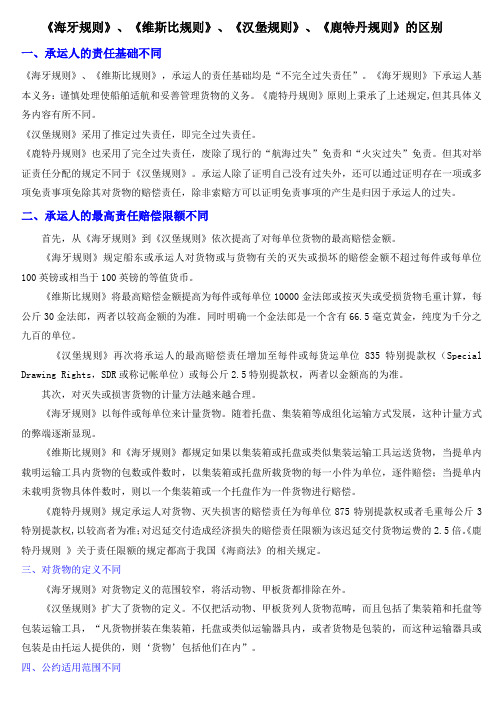
《海牙规则》、《维斯比规则》、《汉堡规则》、《鹿特丹规则》的区别一、承运人的责任基础不同《海牙规则》、《维斯比规则》,承运人的责任基础均是“不完全过失责任”。
《海牙规则》下承运人基本义务:谨慎处理使船舶适航和妥善管理货物的义务。
《鹿特丹规则》原则上秉承了上述规定,但其具体义务内容有所不同。
《汉堡规则》采用了推定过失责任,即完全过失责任。
《鹿特丹规则》也采用了完全过失责任,废除了现行的“航海过失”免责和“火灾过失”免责。
但其对举证责任分配的规定不同于《汉堡规则》。
承运人除了证明自己没有过失外,还可以通过证明存在一项或多项免责事项免除其对货物的赔偿责任,除非索赔方可以证明免责事项的产生是归因于承运人的过失。
二、承运人的最高责任赔偿限额不同首先,从《海牙规则》到《汉堡规则》依次提高了对每单位货物的最高赔偿金额。
《海牙规则》规定船东或承运人对货物或与货物有关的灭失或损坏的赔偿金额不超过每件或每单位100英镑或相当于100英镑的等值货币。
《维斯比规则》将最高赔偿金额提高为每件或每单位10000金法郎或按灭失或受损货物毛重计算,每公斤30金法郎,两者以较高金额的为准。
同时明确一个金法郎是一个含有66.5毫克黄金,纯度为千分之九百的单位。
《汉堡规则》再次将承运人的最高赔偿责任增加至每件或每货运单位835特别提款权(Special Drawing Rights,SDR或称记帐单位)或每公斤2.5特别提款权,两者以金额高的为准。
其次,对灭失或损害货物的计量方法越来越合理。
《海牙规则》以每件或每单位来计量货物。
随着托盘、集装箱等成组化运输方式发展,这种计量方式的弊端逐渐显现。
《维斯比规则》和《海牙规则》都规定如果以集装箱或托盘或类似集装运输工具运送货物,当提单内载明运输工具内货物的包数或件数时,以集装箱或托盘所载货物的每一小件为单位,逐件赔偿;当提单内未载明货物具体件数时,则以一个集装箱或一个托盘作为一件货物进行赔偿。
海商法所涉及的英文解析
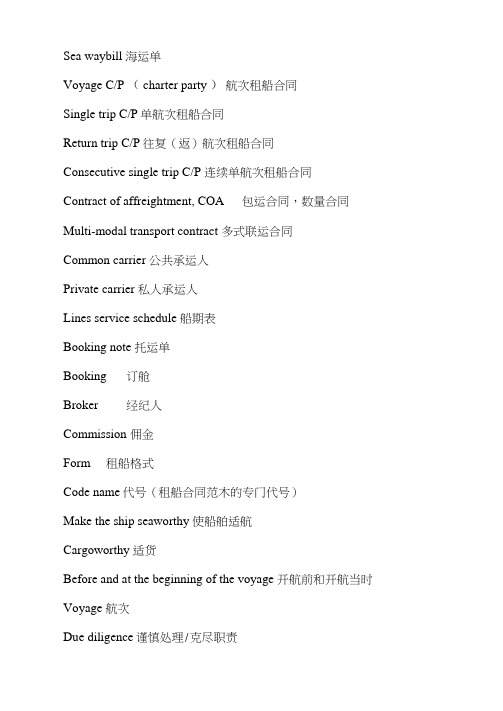
Sea waybill 海运单Voyage C/P ( charter party )航次租船合同Single trip C/P单航次租船合同Return trip C/P往复(返)航次租船合同Consecutive single trip C/P 连续单航次租船合同Contract of affreightment, COA 包运合同,数量合同Multi-modal transport contract 多式联运合同Common carrier 公共承运人Private carrier 私人承运人Lines service schedule 船期表Booking note 托运单Booking 订舱Broker 经纪人Commission 佣金Form 租船格式Code name代号(租船合同范木的专门代号)Make the ship seaworthy 使船舶适航Cargoworthy 适货Before and at the beginning of the voyage 开航前和开航当时Voyage 航次Due diligence谨慎处理/克尽职责Latent defect 潜在缺陷Independent contractor 独立合同人The matter of fact 事实问题In the management of cargo 管理货物管货7环节:装载(load)^搬移(handle)、积载(stow)、运输(carry)、保管(keep)、照料(care for)、卸载(discharge)Properly and carefully 妥善和谨慎Unreasonable deviation 不合理绕航Reasonable deviation 合理绕航Freight prepaid 运费预付Freight collect 运费到付Dead freight 亏舱费Demurrage滞期费Lien留置权Negligence in the navigation of ship 航海过失(驾船过失) Negligence in the management of ship 管船过失Period of responsibility 责任期间Before and after clause 装前卸后条款Special Drawing Right S.D.R 特别提款权Delay in delivery 迟延交付Delivery of good 货物交付Bill of lading B/L 提单Evidence of the contract of carriage of goods by sea 海上货物运输合同的证明Evidence of the taking over or loading of the goods by carrier 承运人接收或者装船的证明Remarks 批注Prima facie evidence 初步证据Conclusive evidence 最终证据In good faith 善意Undertakes to deliver the goods against surrendering the Bill of Loading 提单是承运人据以交付货物的保证Date of shipment 装船日期Shipped B/L 已装船提单Received for shipment B/L 收货待运提单Straight B/L 记名提单Blank B/L 不记名提单Order B/L 指示提单Special endorsement 记名背书Endorsement in blank 空白背书Clean B/L 清洁提单Foul B/L不清洁提单Mate's receipt 大副收据Anti-dated B/L 倒签提单Advanced B/L 预借提单Direct B/L直达提单Transshipment clause 转运条款Transshipment B/L or Through B/L 转运提单Long form B/L 全式提单Short form B/L 简式提单Multimodel B/L 多式联运提单Electronic B/L 电子提单Electronic Data Interchange EDI 电子数据交换系统Paper document 纸质文件Private code 密码CMI Rule for Electronic Bills of Lading国际海事委员会电子提单规则Definition clause 定义条款Merchant 货方Jurisdiction 管辖权Applicable law 法律适用Paramount clause 首要条款Carrieres responsibility 承运人的责任Period of responsibility 责任期间Carriage of good 货物运输Packing and marks 包装和标志Freight and other charges 运费和其他费用Incorrect statement 错误中报Loading , discharging and delivery 装货、卸货和交货Lighterage 驳船费Lien 留置权Notice of loss or damage, time bar 货物灭失或损坏通知、时效Amount of compensation 赔偿金额Dangerous good, contraband 危险品、违禁品Deck cargo, live animal 舱而货、活动物Cargo in container 集装箱货物Refrigerated goods 冷藏货物Timber 木材Iron and steel 铁和钢Bulk cargo, goods to more than one consignee 散装货、超过1 个收货人的货物Heavy lifts and awkward cargo 重货和笨件Fumigation 熏蒸Optional cargo 选港货General average 共同海损New Jason clause 新杰森条款Both to blame collision clause 互有过失碰撞条款War, quarantine, ice, strikes, congestion, etc 战争、检疫、冰冻、罢工、港口拥挤等Local clause 地区条款Harter Act 哈特法Hague Rules海牙规则1924统一提单若干法律规定的国际公约Hague-Visby Rules 海牙-维斯比规则Estopple禁止反供原则Hamburg Rules 汉堡规则Uniform General Charter统一杂货租船合同金康The Baltic and International Maritime Conference BIMCO 波罗的海航运公会Baltime Berth Charter Party Steamer 巴尔的摩C 式Australian Grain Charter Party 澳大利亚谷物租船合同Tanker Voyage Charter Party 油轮航次租船合同Fixture note 订租确认书Description of vessel船舶状况说明条款Owners responsibility clause 船东条款Deviation clause 绕航条款Payment of freight运费支付条款Loading/Discharging 装卸条款Demurrage/Despatch 滞期费速遣费条款Lien clause留置条款Canceling clause合同解除条款Bills of lading 提单条款Both to blame collision clause 互有过失碰撞条款General average and New Jason clause 共同海损和新杰森条款Brokerage commission clause 佣金条款General strike clause 罢工条款War risks clause 战争条款General ice clause 冰冻条款Law and arbitration clause 仲裁和法律适用条款Representation 说明或陈述Substituted vessel 替代船舶Warranty负保证之责Misrepresentation 误述Preliminary voyage 预备航次Laycan (layday)受载期Expected ready to load 做好装货准备Canceling date 解约HInterpellation clause 质询条款Full and complete cargo 满仓满载货物Declaration 宣载Damage for short lift 短装损失Seaworthy trim 适航平衡Under the supervision of the master 船长负监管责任Laytime装卸时间Voyage Charter Party Laytime Interpretation Rules 1993 1993 年航次租船合同装卸时间解释规则装卸时间中英见pl47-148航次租船合同所涉及其他中英见书本Performing carrier 执行承运人(雅典公约)Luggage 行李Cabin luggage自带行李1957年10月统一海上旅客运输若干法律规定的国际公约未生效1961统一海上旅客运输若干规定的国际公约未生效1967统一海上旅客行李运输的国际公约未生效Athene Convention 1974海上旅客及其行李运输雅典公约1987年生效我国94年加入该公约1976年海事赔偿责任限制公约Time charter 定期租船合同Bareboat charter光船租赁合同Lump sum freight 包T•运费Subject to details/Sub-details 以细节确认为条件Subject to contract以合同签订为条件Subject to satisfactory survey 以满意检验为条件Subject to government permission 以政府同意为条件Delivery of the ship 交船Employment and indemnify clause 雇佣及赔偿条款Withdraw of the ship 撤船Load 装货Stow 积载Trim 平舱Discharge 卸货Securing 牢固Supervision and responsibility of the captain 船长的监督与责任监督权利的规定Frustration 合同受阻Non-lien clause无留置条款光船租赁中的条款Free from all encumbrance and any other debts whatsoever 无任何负担及其他任何性质的债务Lump sum 承包型(海上拖航)Daily sum 日租型1910年船舶碰撞公约The Lisbon Rules 1987里斯本规则(碰撞事故损害赔偿规则)1972 (1910)国际海上避碰规则(技术性法律)1952船舶碰撞民事管辖权方而若干规定的国际公约1952统一船舶碰撞或其他航行事故中的刑事管辖权方而若干规定的国际公约Ordinary skill and care 通常的技术和谨慎1995关于审理船舶碰撞和触碰案件财产损害赔偿的规定(中国)Restitution to the previous condition 恢复原状原则Total loss 全损Partial loss部分损失Actual total loss 实际全损Constructive total loss 推定全损International Labour convention 国际劳动公约Compensation for Damages in Collision Cases 船舶碰撞案件的损害赔偿规则Pure salvage 纯粹救助Contract salvage 合同救助No Cure, NO Pay 无效果无报酬1910年救助公约,关于统一海难救助某些法律规定的公约1989年国际救助公约(增加了有关防止和减少环境损害方面救助的规定),1993年我国加入Special compensation 特别补偿General average 共同海损约克安特卫普规则前后6个规则并存使用民间规则共同海损理算Lettered rules 字母规则Numbered rules 数字规则Makis agreement马基斯协议数字规则优先适用北京理算规则General average sacrifice 共同海损牺牲(船舶、货物、运费)General average expenditure 共同海损费用Voluntary stranding 有意搁浅Particular average 单独海损Cash GA. Deposit 由货方提供的共同海损保证金Letter of G.A. Guarantee由货物保险人提供的共同海损担保函G.A. Undertaking由货物提供经货物保险人签署的共同海损分摊保证书G.A. Bond由船货双方签署的共同海损协议书Non-Separation Agreement 船货双方签署的不分离协议Limitation of liability for maritime claims 海事赔偿责任限制1976海事赔偿责任限制公约Global limitation总的责任限制,适用于某个特定事故或某一具体航次引起的各种合同之债和侵权之债。
比较海牙规则、维斯比规则、汉堡规则和鹿特丹规则表格形式

四大海上运输规则对比名称《海牙规则》(The HagueRules) 《维斯比规则》(The VisbyRules)《汉堡规则》(The HamburgRules)《鹿特丹规则》(TheRotterdamRules)颁布时间1924年1968年1978年2008年效力已生效已生效已生效尚未生效诞生背景早期,作为最大货主的美国于1893年通过了《哈特法》(Harter Act),这部法律最大特点就在于对免责的限制。
哈特法这种规定对航运界产生重大影响,并为1924年海牙规则所接受。
随着国际政治、经济形势的变化,以及航海、造船技术日新月异的进步,使海上运输方式发生了重大变革,特别是集装箱运输方式的出现和迅猛发展,《海牙规则》的容已不适应新形势发展的需要。
尤其关于承运人的大量免责条款明显偏袒船方利益,通货膨胀的现实使100英镑的赔偿限额明显过低等原因,到了50年代未,要求修改《海牙规则》的呼声日渐强烈。
为了彻底纠正海运关系中承运人与货主间权利义务失衡的状况。
随着《汉堡规则》的生效,使得海上货物运输合同领域的立法日趋复杂,而国际航海上货物运输法律领域的不统一间接影响贸易的顺利进行,增加因为法律不确定性导致的诉讼成本。
突出特点偏重保护承运人的利益,有利于航运业发达的国家扩大了《海牙规则》的适用围,提高了承运人的赔偿限额,对《海牙规则》进行的修改和补充并未触及其基本制度加重了承运人的责任旨在取代上述三个公约,以真正实现海上货物运输法律制度的国际统一加入成员75个30个34个24个签字国,只有西班牙递交了批准书适用围仅适用于在缔约国签发的提单。
在缔约国签发的提单;货物在一个缔约国的港口起运;提单载明或为提单所证明的合同规定,该合同受公约的各项规则或者使公约生效的任何一个国家的立法所约束,不论承运人、托运人或者任何其他有关人员的国籍如何。
即只要当事人自愿选择适用,则该提单或运输合同就要受《维斯比规则》的约束根据《汉堡规则》的规定,凡《海牙规则》和/或《维斯比规则》的成员,在加入《汉堡规则》时,必须声明退出以上两个条约。
《海牙规则》《维斯比规则》和《汉堡规则》的区别
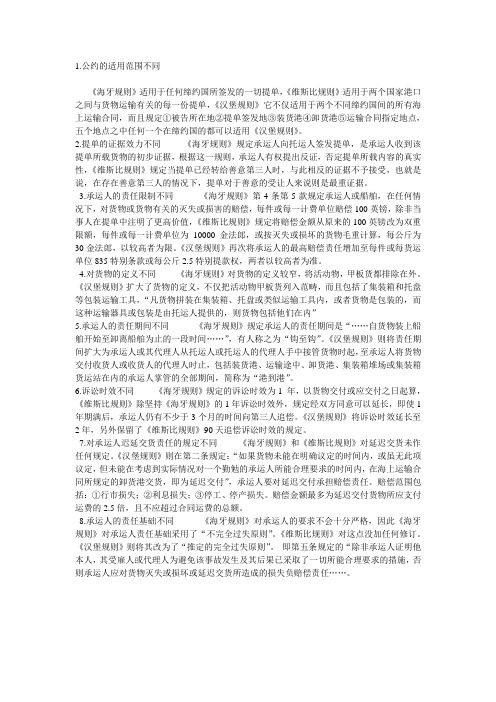
1.公约的适用范围不同《海牙规则》适用于任何缔约国所签发的一切提单,《维斯比规则》适用于两个国家港口之间与货物运输有关的每一份提单,《汉堡规则》它不仅适用于两个不同缔约国间的所有海上运输合同,而且规定①被告所在地②提单签发地③装货港④卸货港⑤运输合同指定地点,五个地点之中任何一个在缔约国的都可以适用《汉堡规则》。
2.提单的证据效力不同《海牙规则》规定承运人向托运人签发提单,是承运人收到该提单所载货物的初步证据,根据这一规则,承运人有权提出反证,否定提单所载内容的真实性,《维斯比规则》规定当提单已经转给善意第三人时,与此相反的证据不予接受,也就是说,在存在善意第三人的情况下,提单对于善意的受让人来说则是最重证据。
3.承运人的责任限制不同《海牙规则》第4条第5款规定承运人或船舶,在任何情况下,对货物或货物有关的灭失或损害的赔偿,每件或每一计费单位赔偿100英镑,除非当事人在提单中注明了更高价值,《维斯比规则》规定将赔偿金额从原来的100英镑改为双重限额,每件或每一计费单位为10000金法郎,或按灭失或损坏的货物毛重计算,每公斤为30金法郎,以较高者为限。
《汉堡规则》再次将承运人的最高赔偿责任增加至每件或每货运单位835特别条款或每公斤2.5特别提款权,两者以较高者为准。
4.对货物的定义不同《海牙规则》对货物的定义较窄,将活动物,甲板货都排除在外。
《汉堡规则》扩大了货物的定义,不仅把活动物甲板货列入范畴,而且包括了集装箱和托盘等包装运输工具,“凡货物拼装在集装箱、托盘或类似运输工具内,或者货物是包装的,而这种运输器具或包装是由托运人提供的,则货物包括他们在内”5.承运人的责任期间不同《海牙规则》规定承运人的责任期间是“……自货物装上船舶开始至卸离船舶为止的一段时间……”,有人称之为“钩至钩”。
《汉堡规则》则将责任期间扩大为承运人或其代理人从托运人或托运人的代理人手中接管货物时起,至承运人将货物交付收货人或收货人的代理人时止,包括装货港、运输途中、卸货港、集装箱堆场或集装箱货运站在内的承运人掌管的全部期间,简称为“港到港”。
海牙规则与维斯比规则、汉堡规则比较表

海牙规则与维斯比规则、汉堡规则三大提单公约比较对照表
《海牙规则》
《维斯比规则》
《汉堡规则》
通过时间
1924年
1968年
1978年
承运人的
基本义务
适航义务、管货义务、不做不合理绕航的义务
无明确规定,但应不低于前二者
责任制度
不完全过失责任
完全过失责任
承运人的
责任期间
钩至钩
收到交
承运人
的免责
包括“航行过失”免责在内的17项免责
如损失由承运人、其雇佣人或代理人故意造成,则丧失责任限制权利
实际承运人
未规定
未规定
订约善意有效/恶意无效
舱面货
活牲畜
不适用
不适用
依约定/惯例可装舱面货;活牲畜固有风险免责
诉讼时效
一年
一年,可协商延长,对第三者的追偿,还有3个月宽限期
两年
取消了“航行过失”免责
延迟交货的责任
未规定
限额为迟交货物应付运费的2.5倍,但不应超过所有货物应付运费的总额
承运人赔
偿限额
每件或每单位100英镑
(1)每件或每单位666.67特(2)毛重每公斤2特。二者以高者为准
海牙-维斯比规则中英对照
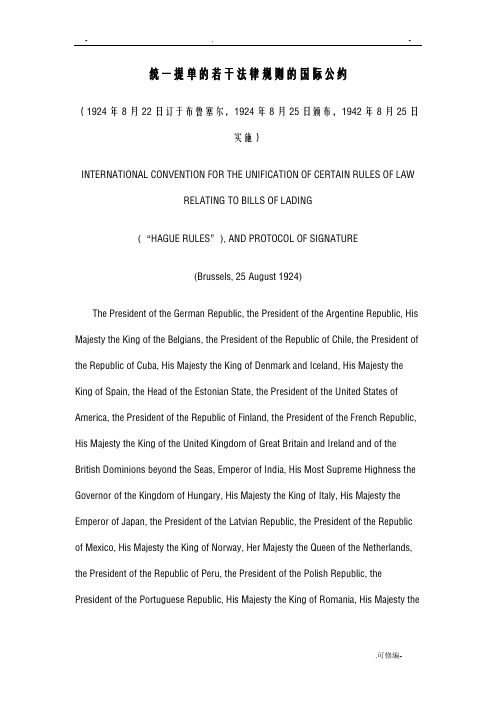
统一提单的若干法律规则的国际公约(1924年8月22日订于布鲁塞尔,1924年8月25日颁布,1942年8月25日实施)INTERNATIONAL CONVENTION FOR THE UNIFICATION OF CERTAIN RULES OF LAWRELATING TO BILLS OF LADING(“HAGUE RULES”), AND PROTOCOL OF SIGNATURE(Brussels, 25 August 1924)The President of the German Republic, the President of the Argentine Republic, His Majesty the King of the Belgians, the President of the Republic of Chile, the President of the Republic of Cuba, His Majesty the King of Denmark and Iceland, His Majesty the King of Spain, the Head of the Estonian State, the President of the United States of America, the President of the Republic of Finland, the President of the French Republic, His Majesty the King of the United Kingdom of Great Britain and Ireland and of the British Dominions beyond the Seas, Emperor of India, His Most Supreme Highness the Governor of the Kingdom of Hungary, His Majesty the King of Italy, His Majesty the Emperor of Japan, the President of the Latvian Republic, the President of the Republic of Mexico, His Majesty the King of Norway, Her Majesty the Queen of the Netherlands, the President of the Republic of Peru, the President of the Polish Republic, the President of the Portuguese Republic, His Majesty the King of Romania, His Majesty theKing of the Serbs, Croats and Slovenes, His Majesty the King of Sweden, and the President of the Republic of Uruguay,HAVING RECOGNIZED the utility of fixing by agreement certain uniform rules of law relating to bills of lading,HAVE DECIDED to conclude a convention with this object and have appointed the following Plenipotentiaries:WHO, duly authorized thereto, have agreed as follows:第一条Article 1本公约所用下列各词,涵义如下:In this Convention the following words are employed with the meanings set out below: (a) “承运人”包括与托运人订有运输合同的船舶所有人或租船人。
国际海运公约(海牙规则、维斯比规则、汉堡规则、鹿特丹规则)

上海海洋大学 高职学院
❖ 《海牙规则》对于承运人的免责太多,这样对托运
人是不公平的,所以,后来的《维斯比规则》对《海 牙规则》进行了一些修改和补充。这些修改和补充加 大了承运人的赔偿限额,但是这并没有从根本上改变 托运人不利的处境,《汉堡规则》相比较而言就比较 公平合理。
一、《海牙规则》概述
上海海洋大学 高职学院
六、索赔与诉讼时效
上海海洋大学 高职学院
❖ 索赔通知是收货人在接受货物时,就货物的短少或 残损状况向承运人提出的通知,它是索赔的程序之 一。收货人向承运人提交索赔通知,意味着收货人有 可能就货物短损向承运人索赔《海牙规则》第三条第 六款规定:承运人将货物交付给收货人时,如果收
货人未将索赔通知用书面形式提交承运人或其代理人, 则这种交付应视为承运人已按提单规定交付货物的初 步证据。如果货物的灭失和损坏不明显,则收货人应
在收到货物之日起3日内将索赔通知提交承运人。
上海海洋大学 高职学院
❖ 《海牙规则》有关诉讼时效的规定是:“除非从货 物交付之日或应交付之日起一年内提起诉讼,承运
人和船舶,在任何情况下,都应免除对灭失或损坏所 负的一切责任。”
七、托运人的义务和责任
上海海洋大学 高职学院
❖ ①保证货物说明正确的义务。《海牙规则》第三 条第五款规定:“托运人应向承运人保证他在货 物装船时所提供的标志、号码、数量和重量的正 确性,并在对由于这种资料不正确所引起或造成 的一切灭失、损害和费用,给予承运人赔偿。”
国际海运规则海牙规则维斯比规则汉堡规则鹿特丹规则上海海洋大学高职学院国际海运公约海牙规则维斯比规则汉堡规则鹿特丹规则上海海洋大学高职学院海牙规则五承运人的赔偿责任限额四承运人的责任期间三承运人的免责二承运人的最低责任限度一海牙规则概述上海海洋大学高职学院一海牙规则概述11海牙规则的产生背景?海牙规则haguerules全称为统一提单的若干法律规定的国际公约internationalconventionfortheunificationofcertainrulesoflawrelatingtobillsoflading1924关于提单法律规定的第一部国际公约
海牙规则(Hague)、海牙-维斯比规则(HagueVisby)、汉堡规则(Hamburg)的区别

从《海牙规则》到《汉堡规则》有关提单的国际公约在内容上发生了质的变化,对当事各方利益的保护更加合理,也适应了不断发展的航运技术的要求。
总的来讲,这三个国际公约实质上的区别主要在以下几个方面:一、承运人的责任基础不同《海牙规则》由于在当时的历史背景下,船东的强大势力和航运技术条件的限制决定了《海牙规则》对承运人的要求不会十分严格,因此《海牙规则》对承运人责任基础采用了“不完全过失原则”。
《维斯比规则》对这点没加任何修订。
《汉堡规则》则将其改为了“推定的完全过失原则”。
所谓“过失原则”是指有过失即负责,无过失即不负责,一般国家的民法多采用这一原则为基础。
《海牙规则》总的规定也是要求承运人对自己的过失承担责任,但同时又规定“船长、船员、引航员或承运人的雇佣人员在驾驶或管理船舶上的行为、疏忽或不履行契约”可以要求免责(也是《海牙规则》遭非议最多的条款),即有过失也无须负责,因此,《海牙规则》被认为采用的是不完全过失原则。
比起过失原则,这种责任制度虽然对承运人网开一面,但在当时的历史条件下还是有着明显的进步意义的。
《汉堡规则》的立场则严格得多,它不仅以是否存在过失来决定承运人是否负责,而且规定举证责任也要由承运人承担,即第五条规定的“除非承运人证明他本人,其受雇人或代理人为避免该事故发生及其后果已采取了一切所能合理要求的措施,否则承运人应对货物灭失或损坏或延迟交货所造成的损失负赔偿责任……。
”这样承运人的责任大大加重了。
二、承运人的最高责任赔偿限额不同首先,从《海牙规则》到《汉堡规则》依次提高了对每单位货物的最高赔偿金额。
《海牙规则》规定船东或承运人对货物或与货物有关的灭失或损坏的赔偿金额不超过每件或每单位100英镑或相当于100英镑的等值货币。
《维斯比规则》将最高赔偿金额提高为每件或每单位10000金法郎或按灭失或受损货物毛重计算,每公斤30金法郎,两者以较高金额的为准。
同时明确一个金法郎是一个含有66.5毫克黄金,纯度为千分之九百的单位。
国际经济法第四章国际货物运输(一)三个公约比较s解读

周超 2009年10月
提纲
调整班轮运输的国际公约
–海牙规则 Hague Rules –海牙维斯比规则 Hague-Visby Rules –汉堡规则 Hamburg Rules
1.《海牙规则》
《统一提单的若干法律规则的国际公约》 (International Convention for the
承运人的第二项义务是应适当和谨慎地装载、 操作、积载、运送、保管、照料和卸载所承运 的货物。
Immunities:
Neither the carrier nor the ship shall be responsible for loss or damage arising or resulting from
Unification of Certain Rules of Law Relating to Bills of Lading) 简称《海牙规则》,(Hague Rules) 该公约共有 16 条规定, 《海牙规则》于1931 年6月2日生效。中国未加入该公约。《海牙规 则》是目前在国际航运业影响最大的一个公约 。
3.《汉堡规则》
《1978年联合国海上货物运输公约》 (United Nations Convention on the Carriage of Goods by Sea, 1978) 简称《汉堡规则》,(Hamburg Rules) 1992年11月1日生效,中国没有加入。
1.承运人最低责任
Hague Rules第3条第1款规定:
(g) arrest or restraint of princes, rulers or people, or seizure under legal process; (7)政府或主管部门的行为。
5-2 海牙-维斯比规则 E

Australian Treaty Series1993No23AND TRADEDEPARTMENT OF FOREIGN AFFAIRSAFFAIRSANDCANBERRAProtocol(SDR Protocol)amending the International Convention for the Unification of Certain Rules of Law relating to Bills of Lading of25August1924(The Hague Rules),as amended by the Protocol of23February1968(Visby Rules)(Brussels,21December1979)Entry into force generally:14February1984Entry into force for Australia:16October1993AUSTRALIAN TREATY SERIES1993No.23Australian Government Publishing ServiceCanberra(c)Commonwealth of Australia1995PROTOCOL [1]AMENDING THE INTERNATIONAL CONVENTION FOR THE UNIFICATION OF CERTAIN RULES OF LAW RELATING TO BILLSOF LADING OF 25AUGUST 1924,AS ASAMENDEDAMENDED BY THE PROTOCOL OF 23FEBRUARY 1968THE CONTRACTING PARTIES PARTIESTOTO THE PRESENT PROTOCOL,BEING PARTIES to the International Convention for the unification of certain rules of law relating to bills of lading,done at Brussels on 25th August 1924[2],as amended by the Protocol toamend that Convention,done at Brussels on 23rd February 1968[3],HAVE AGREED as follows:Article IFor the purpose of this Protocol,"Convention"means the International Convention for the unification of certain rules of law relating to bills of lading and its Protocol of signature,done at Brussels on 25th August 1924,as amended by the Protocol,done at Brussels on 23rd February1968.Article II(1)Article 4,paragraph 5(a)of the Convention is replaced by the following:"(a)Unless the nature and value of such goods have been declared by the shipper before shipment and inserted in the bill of lading,neither the carrier nor the ship shall in any event be or become liable for any loss or damage to or in connection with the goods in an amount exceeding 666.67units of account per package or unit or 2units of account per kilogramme of gross weight of thegoods lost or damaged,whichever is the higher."(2)Article 4,paragraph 5(d)of the Convention is replaced by the following:"(d)The unit of account mentioned in this Article is the Special Drawing Right as defined by the International Monetary Fund.The amounts mentioned in sub-paragraph (a)of this paragraph shall be converted into national currency on the basis of the value of that currency on a date to bedetermined by the law of the Court seized of the case.The value of the national currency,in terms of the Special Drawing Right,of a State which is a member of the International Monetary Fund,shall be calculated in accordance with the method of valuation applied by the International Monetary Fund in effect at the date in question for its operations and transactions.The value of the national currency,in terms of the Special Drawing Right,of a State which is not a member of the International Monetary Fund,shall be calculated in amanner determined by that State.Nevertheless,a State which is not a member of the International Monetary Fund and whose law does not permit the application of the provisions of the preceding sentences may,at the time of ratification of the Protocol of1979or accession thereto or at any time thereafter,declare that the limits of liability provided for in this Convention to be applied in its territory shall be fixed asfollows:(i)in respect of the amount of666.67units of account mentioned in sub-paragraph(a)of paragraph5of this Article,10,000monetary units;(ii)in respect of the amount of2units of account mentioned in sub-paragraph(a)of paragraph5ofthis Article,30monetary units.The monetary unit referred to in the preceding sentence corresponds to65.5milligrammes of gold of millesimal fineness900'.The conversion of the amounts specified in that sentence into the national currency shall be made according to the law of the State concerned.The calculation and the conversion mentioned in the preceding sentences shall be made in such a manner as to express in the national currency of the State as far as possible the same real value for the amounts in sub-paragraph(a)of paragraph5of this Article as is expressed there in units ofaccount.States shall communicate to the depositary the manner of calculation or the result of the conversion as the case may be,when depositing an instrument of ratification of the Protocol of1979or of accession thereto and whenever there is a change in either."Article IIIAny dispute between two or more Contracting Parties concerning the interpretation or application of the present Protocol,which cannot be settled through negotiation,shall,at the request of one of them,be submitted to arbitration.If within six months from the date of the request for arbitration the Parties are unable to agree on the organisation of the arbitration,any one of those Parties may refer the dispute to the International Court of Justice by request in conformity with the Statute of theCourt.Article IV(1)Each Contracting Party may at the time of signature or ratification of this Protocol or ofaccession thereto,declare that it does not consider itself bound by Article III.(2)Any Contracting Party having made a reservation in accordance with paragraph(1)may at anytime withdraw this reservation by notification to the Belgian Government.Article VThis Protocol shall be open for signature by the States which have signed the Convention of25 August1924or the Protocol of23February1968or which are Parties to the Convention.Article VI(1)This Protocol shall be ratified.(2)Ratification of this Protocol by any State which is not a Party to the Convention shall have theeffect of ratification of the Convention.(3)The instruments of ratification shall be deposited with the Belgian Government.Article VII(1)States not referred to in Article V may accede to this Protocol[4].(2)Accession to this Protocol shall have the effect of accession to the Convention.(3)The instruments of accession shall be deposited with the Belgian Government.Article VIII(1)This Protocol shall come into force three months after the date of the deposit of five instrumentsof ratification or accession[5].(2)For each State which ratifies this Protocol or accedes thereto after the fifth deposit,this Protocol shall come into force three months after the deposit of its instrument of ratification or accession[6].Article IX(1)Any Contracting Party may denounce this Protocol by notification to the Belgian Government.(2)The denunciation shall take effect one year after the date on which the notification has beenreceived by the Belgian Government.Article X(1)Each State may at the time of signature,ratification or accession or at any time thereafter declareby written notification to the Belgian Government which among the territories for whose international relations it is responsible,are those to which the present Protocol applies.The Protocol shall three months after the date of the receipt of such notification by the Belgian Government extend to the territories named therein,but not before the date of the coming into force of theProtocol in respect of such State.(2)This extension also shall apply to the Convention if the latter is not yet applicable to theseterritories.(3)Any Contracting Party which has made a declaration under paragraph(1)of this Article may at any time thereafter declare by notification given to the Belgian Government that the Protocol shallcease to extend to such territories.This denunciation shall take effect one year after the date on which notification thereof has been received by the Belgian Government.Article XIThe Belgian Government shall notify the signatory and acceding States of the following:1.The signatures,ratifications and accessions received in accordance with Articles V,VI and VII.2.The date on which the present Protocol will come into force in accordance with Article VIII.3.The notifications with regard to the territorial application in accordance with Article X.4.The declarations and communications made in accordance with Article II.5.The declarations made in accordance with Article IV.6.The denunciations received in accordance with Article IX.WHEREOF the undersigned,duly authorized thereto,have signed this Protocol. IN WITNESSWITNESSWHEREOFDONE at Brussels,this21st day of December1979,in the English and French languages,both texts being equally authentic,in a single copy,which shall remain deposited in the archives of the Belgian Government,which shall issue certified copies.[Signatures not reproduced here.]PROTOCOL[7]TO AMEND THE INTERNATIONAL CONVENTION FOR THE UNIFICATION OF CERTAIN RULES OF LAW RELATING TO BILLS OF LADING,DONE AT BRUSSELS ON25AUGUST1924THE CONTRACTING PARTIES,CONSIDERING that it is desirable to amend the International Convention for the unification of certain rules of law relating to Bills of Lading,signed at Brussels on25th August1924,HAVE AGREED as follows:Article1(1)In Article3,paragraph4,shall be added:"However,proof to the contrary shall not be admissible when the Bill of Lading has beentransferred to a third party acting in good faith".(2)In Article3,paragraph6,sub-paragraph4shall be deleted and replaced by:"Subject to paragraph6bis the carrier and the ship shall in any event be discharged from all liability whatsoever in respect of the goods,unless suit is brought within one year of their delivery or of the date when they should have been delivered.This period may,however,be extended if the parties soagree after the cause of action has arisen".(3)In Article3,after paragraph6,shall be added the following paragraph6bis:"An action for indemnity against a third person may be brought even after the expiration of the year provided for in the preceding paragraph if brought within the time allowed by the law of the Court seized of the case.However,the time allowed shall be not less than three months,commencing from the day when the person bringing such action for indemnity has settled the claim or has beenserved with process in the action against himself".Article2Article4,paragraph5,shall be deleted and replaced by the following:"(a)Unless the nature and value of such goods have been declared by the shipper before shipment and inserted in the Bill of Lading,neither the carrier nor the ship shall in any event be or become liable for any loss or damage to or in connection with the goods in an amount exceeding the equivalent of10,000francs per package or unit or30francs per kilo of gross weight of the goodslost or damaged,whichever is the higher.(b)The total amount recoverable shall be calculated by reference to the value of such goods at the place and time at which the goods are discharged from the ship in accordance with the contract orshould have been so discharged.The value of the goods shall be fixed according to the commodity exchange price,or,if there be no such price,according to the current market price,or,if there be no commodity exchange price or current market price,by reference to the normal value of goods of the same kind and quality.(c)Where a container,pallet or similar article of transport is used to consolidate goods,the number of packages or units enumerated in the Bill of Lading as packed in such article of transport shall be deemed the number of packages or units for the purpose of this paragraph as far as these packages or units are concerned.Except as aforesaid such article of transport shall be considered the packageor unit.(d)A franc means a unit consisting of65.5milligrammes of gold of millesimal fineness900'.The date of conversion of the sum awarded into national currencies shall be governed by the law of theCourt seized of the case.(e)Neither the carrier nor the ship shall be entitled to the benefit of the limitation of liability provided for in this paragraph if it is proved that the damage resulted from an act or omission of the carrier done with intent to cause damage,or recklessly and with knowledge that damage wouldprobably result.(f)The declaration mentioned in sub-paragraph(a)of this paragraph,if embodied in the Bill ofLading,shall be prima facie evidence,but shall not be binding or conclusive on the carrier.(g)By agreement between the carrier,master or agent of the carrier and the shipper other maximum amounts than those mentioned in sub-paragraph(a)of this paragraph may be fixed,provided that no maximum amount so fixed shall be less than the appropriate maximum mentioned in that sub-paragraph.(h)Neither the carrier nor the ship shall be responsible in any event for loss or damage to,or in connection with,goods if the nature or value thereof has been knowingly mis-stated by the shipperin the Bill of Lading".Article3Between Articles4and5of the Convention shall be inserted the following Article4bis:"1.The defences and limits of liability provided for in this Convention shall apply in any action against the carrier in respect of loss or damage to goods covered by a contract of carriage whetherthe action be founded in contract or in tort.2.If such an action is brought against a servant or agent of the carrier(such servant or agent notbeing an independent contractor),such servant or agent shall be entitled to avail himself of the defences and limits of liability which the carrier is entitled to invoke under this Convention.3.The aggregate of the amounts recoverable from the carrier,and such servants and agents,shall inno case exceed the limit provided for in this Convention.4.Nevertheless,a servant or agent of the carrier shall not be entitled to avail himself of the provisions of this Article,if it is proved that the damage resulted from an act or omission of the servant or agent done with intent to cause damage or recklessly and with knowledge that damagewould probably result".Article4Article9of the Convention shall be deleted and replaced by the following:"This Convention shall not affect the provisions of any international Convention or national lawgoverning liability for nuclear damage".Article5Article10of the Convention shall be deleted and replaced by the following:"The provisions of this Convention shall apply to every Bill of Lading relating to the carriage ofgoods between ports in two different States if:(a)the Bill of Lading is issued in a Contracting State,or(b)the carriage is from a port in a Contracting State,or(c)the contract contained in or evidenced by the Bill of Lading provides that the rules of thisConvention or legislation of any State giving effect to them are to govern the contractwhatever may be the nationality of the ship,the carrier,the shipper,the consignee,or any otherinterested person.Each Contracting State shall apply the provisions of this Convention to the Bills of Ladingmentioned above.This Article shall not prevent a Contracting State from applying the rules of this Convention to Bills of Lading not included in the preceding paragraphs".Article6As between the Parties to this Protocol the Convention and the Protocol shall be read andinterpreted together as one single instrument.A Party to this Protocol shall have no duty to apply the provisions of this Protocol to Bills of Ladingissued in a State which is a Party to the Convention but which is not a Party to this Protocol.Article7As between the Parties to this Protocol,denunciation by any of them of the Convention in accordance with Article15thereof,shall not be construed in any way as a denunciation of theConvention as amended by this Protocol.Article8Any dispute between two or more Contracting Parties concerning the interpretation or application of the Convention which cannot be settled through negotiation,shall,at the request of one of them, be submitted to arbitration.If within six months from the date of the request for arbitration the Parties are unable to agree on the organization of the arbitration,any one of those Parties may refer the dispute to the International Court of Justice by request in conformity with the Statute of theCourt.Article9(1)Each Contracting Party may at the time of signature or ratification of this Protocol or accessionthereto,declare that it does not consider itself bound by Article8of this Protocol.The other Contracting Parties shall not be bound by this Article with respect to any Contracting Party havingmade such a reservation.(2)Any Contracting Party having made a reservation in accordance with paragraph1may at anytime withdraw this reservation by notification to the Belgian Government.Article10This Protocol shall be open for signature by the States which have ratified the Convention or which have adhered thereto before the23rd February1968,and by any State represented at the twelfth session(1967-1968)of the Diplomatic Conference on Maritime Law.Article11(1)This Protocol shall be ratified.(2)Ratification of this Protocol by any State which is not a Party to the Convention shall have theeffect of accession to the Convention.(3)The instruments of ratification shall be deposited with the Belgian Government.Article12(1)States,Members of the United Nations or Members of the specialized agencies of the United Nations,not represented at the twelfth session of the Diplomatic Conference on Maritime Law,mayaccede to this Protocol.(2)Accession to this Protocol shall have the effect of accession to the Convention.(3)The instruments of accession shall be deposited with the Belgian Government.Article13(1)This Protocol shall come into force three months after the date of the deposit of ten instruments of ratification or accession,of which at least five shall have been deposited by States that have eacha tonnage equal or superior to one million gross tons of tonnage.(2)For each State which ratifies this Protocol or accedes thereto after the date of deposit of the instrument of ratification or accession determining the coming into force such as is stipulated in paragraph(1)of this Article,this Protocol shall come into force three months after the deposit of itsinstrument of ratification or accession.Article14(1)Any Contracting State may denounce this Protocol by notification to the Belgian Government.(2)This denunciation shall have the effect of denunciation of the Convention.(3)The denunciation shall take effect one year after the date on which the notification has beenreceived by the Belgian Government.Article15(1)Any Contracting State may at the time of signature,ratification or accession or at any time thereafter declare by written notification to the Belgian Government which among the territories under its sovereignty or for whose international relations it is responsible,are those to which thepresent Protocol applies.The Protocol shall three months after the date of the receipt of such notification by the Belgian Government extend to the territories named therein,but not before the date of the coming into forceof the Protocol in respect of such State.(2)This extension also shall apply to the Convention if the latter is not yet applicable to thoseterritories.(3)Any Contracting State which has made a declaration under paragraph(1)of this Article may at any time thereafter declare by notification given to the Belgian Government that the Protocol shall cease to extend to such territory.This denunciation shall take effect one year after the date on which notification thereof has been received by the Belgian Government;it also shall apply to theConvention.Article16The Contracting Parties may give effect to this Protocol either by giving it the force of law or by including in their national legislation in a form appropriate to that legislation the rules adoptedunder this Protocol.Article17The Belgian Government shall notify the States represented at the twelfth session(1967-1968)of the Diplomatic Conference on Maritime Law,the acceding States to this Protocol,and the StatesParties to the Convention,of the following:1.The signatures,ratifications and accessions received in accordance with Articles10,11and12.2.The date on which the present Protocol will come into force in accordance with Article13.3.The notifications with regard to the territorial application in accordance with Article 15.4.The denunciations received in accordance with Article 14.IN WITNESS WITNESSWHEREOFWHEREOF the undersigned Plenipotentiaries,duly authorized,have signed this Protocol.DONE at Brussels,this 23rd day of February 1968,in the French and English languages,both textsbeing equally authentic,in a single copy,which shall remain deposited in the archives of theBelgian Government,which shall issue certified copies.[Signatures not reproduced here.][1]Known as the SDR Protocol.[2]Known as The Hague Rules.ATS 1956No.2UKTS 1931No.17(Cmd.3806);LNTS 120p.155.[3]Known as the Visby Rules.For text see page 6.[4]Instrument of accession deposited for Australia 16July 1993,together with the followingstatement:"Australia hereby expresses its intention not to be considered,in relation to any state,as a party to the International Convention for the Unification of certain Rules of Law relating to Bills of Lading,done at Brussels on August 25,1924,in its unamended form,or to that Convention as amended bythe Protocol to amend that Convention,done at Brussels on February 23,1968."[5]The Protocol entered into force generally 14February 1984.[6]The Protocol entered into force for Australia 16October 1993.。
海牙规则、维斯比规则、汉堡规则、我国海商法的区别

1《海商法》提单的证据力:第七十五条承运人或者代其签发提单的人,知道或者有合理的根据怀疑提单记载的货物的品名、标志、包数或者件数、重量或者体积与实际接收的货物不符,在签发己装船提单的情况下怀疑与已装船的货物不符,或者没有适当的方法核对提单记载的,可以在提单上批注,说明不符之处、怀疑的根据或者说明无法核对。
第七十六条承运人或者代其签发提单的人未在提单上批注货物表面状况的,视为货物的表面状况良好。
第七十七条除依照本法第七十五条的规定作出保留外,承运人或者代其签发提单的人签发的提单,是承运人已经按照提单所载状况收到货物或者货物已经装船的初步证据;承运人向善意受让提单的包括收货人在内的第三人提出的与提单所载状况不同的证据,不予承认。
2《海商法》承运人赔偿责任基础:第五十九条经证明,货物的灭失、损坏或者迟延交付是由于承运人的故意或者明知可能造成损失而轻率地作为或者不作为造成的,承运人不得援用本法第五十六条或者第五十七条限制赔偿责任的规定。
经证明,货物的灭失、损坏或者迟延交付是由于承运人的受雇人、代理人的故意或者明知可能造成损失而轻率地作为或者不作为造成的,承运人的受雇人或者代理人不得援用本法第五十六条或者第五十七条限制赔偿责任的规定。
第六十条承运人将货物运输或者部分运输委托给实际承运人履行的,承运人仍然应当依照本章规定对全部运输负责。
对实际承运人承担的运输,承运人应当对实际承运人的行为或者实际承运人的受雇人、代理人在受雇或者受委托的范围内的行为负责。
虽有前款规定,在海上运输合同中明确约定合同所包括的特定的部分运输由承运人以外的指定的实际承运人履行的,合同可以同时约定,货物在指定的实际承运人掌管期间发生的灭失、损坏或者迟延交付,承运人不负赔偿责任。
3《海商法》诉讼时效:第二百五十七条就海上货物运输向承运人要求赔偿的请求权,时效期间为一年,自承运人交付或者应当交付货物之日起计算;在时效期间内或者时效期间届满后,被认定为负有责任的人向第三人提起追偿请求的,时效期间为90日,自追偿请求人解决原赔偿请求之日起或者收到受理对其本人提起诉讼的法院的起诉状副本之日起计算。
三个海运法则:海牙法则、维斯比法则、汉堡法则

海牙规则海牙规则(Hague Rules)全称为《统一提单的若干法律规定的国际公约》。
也是关于提单法律规定的第一部国际公约。
早期,作为最大货主的美国于1893年通过了《哈特法》(Harter Act),这部法律最大特点就在于对免责的限制。
哈特法这种规定对航运界产生重大影响,并为1924年海牙规则所接受。
海牙规则规定了承运人最低限度义务,免责事项,索赔和诉讼,责任限制和适用范围以及程序性等几个方面。
对于承运人免责事项,海牙规则第4条2款列举了11项免责事项。
11项免责事项,尤其是航行和管船过失亦免责奠定了海牙规则关于承运人的不完全过失责任制的基础。
对于索赔和诉讼时效,海牙规则均规定了较短时间。
索赔通知为交货前或当时,货物灭失、损坏不明显为移交后3日内并以书面形式。
但双方进行联合检查者除外。
海牙规则规定了一年的诉讼时效,自货物交付或应当交付之日起一年内。
对于责任限制,海牙规则规定了每件或每单位100英镑的最高赔偿额。
但托运人装货前就货物性质和价值另有声明并载入提单的则不在此限。
至于适用范围,公约适用于任何缔约国内签发的提单。
这使海牙规则的适用范围有限。
因而,人们常常用提单(B/L)中的首要条款(Paramount Clause)扩大海牙规则的适用范围。
总体看来,《海牙规则》无论是对承运人义务的规定,还是免责事项,索赔诉讼,责任限制,均是体现着承运方的利益。
而对货主的保护则相对较少。
这也是船货双方力量不均衡的体现。
力量不均衡势力相互妥协的产物不可避免地有各种缺点和不足。
比如期限过短,限额过低等。
而且,随着国际经贸的发展,海牙规则的部份内容已落后,不适应新的需要。
对其修改已成为种必然趋势。
这样,从60年代开始,国际海事委员会着手修改海牙规则,于1968年2月通过了《关于修订统一提单若干法律规定的国际公约的协定书》,简称《海牙—维斯比规则》,并于1977年6月生效,这就是维斯比规则。
1978年3月6日至31日在德国汉堡举行由联合国主持的由78国代表参加的海上货物运输大会又通过了《汉堡规则》,即联合国海上货物运输公约(United Nations Conventiononthe Carriage of GoodsbySea,1978),于1992年11月1日生效,进一步完善了海上货物运输规则。
比较关于海上货物运输合同的四个国际公约(3篇)
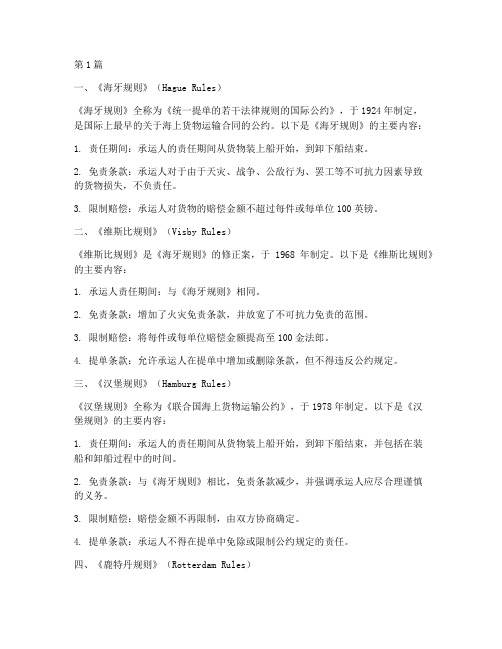
第1篇一、《海牙规则》(Hague Rules)《海牙规则》全称为《统一提单的若干法律规则的国际公约》,于1924年制定,是国际上最早的关于海上货物运输合同的公约。
以下是《海牙规则》的主要内容:1. 责任期间:承运人的责任期间从货物装上船开始,到卸下船结束。
2. 免责条款:承运人对于由于天灾、战争、公敌行为、罢工等不可抗力因素导致的货物损失,不负责任。
3. 限制赔偿:承运人对货物的赔偿金额不超过每件或每单位100英镑。
二、《维斯比规则》(Visby Rules)《维斯比规则》是《海牙规则》的修正案,于1968年制定。
以下是《维斯比规则》的主要内容:1. 承运人责任期间:与《海牙规则》相同。
2. 免责条款:增加了火灾免责条款,并放宽了不可抗力免责的范围。
3. 限制赔偿:将每件或每单位赔偿金额提高至100金法郎。
4. 提单条款:允许承运人在提单中增加或删除条款,但不得违反公约规定。
三、《汉堡规则》(Hamburg Rules)《汉堡规则》全称为《联合国海上货物运输公约》,于1978年制定。
以下是《汉堡规则》的主要内容:1. 责任期间:承运人的责任期间从货物装上船开始,到卸下船结束,并包括在装船和卸船过程中的时间。
2. 免责条款:与《海牙规则》相比,免责条款减少,并强调承运人应尽合理谨慎的义务。
3. 限制赔偿:赔偿金额不再限制,由双方协商确定。
4. 提单条款:承运人不得在提单中免除或限制公约规定的责任。
四、《鹿特丹规则》(Rotterdam Rules)《鹿特丹规则》全称为《联合国关于国际货物运输合同的联合国国际货物运输公约》,于2008年制定。
以下是《鹿特丹规则》的主要内容:1. 责任期间:承运人的责任期间从货物交承运人开始,到交付收货人结束。
2. 免责条款:与《汉堡规则》相比,免责条款有所减少,并强调承运人应尽合理谨慎的义务。
3. 限制赔偿:赔偿金额不再限制,由双方协商确定。
4. 提单条款:承运人不得在提单中免除或限制公约规定的责任。
海牙规则、维斯比规则、汉堡规则
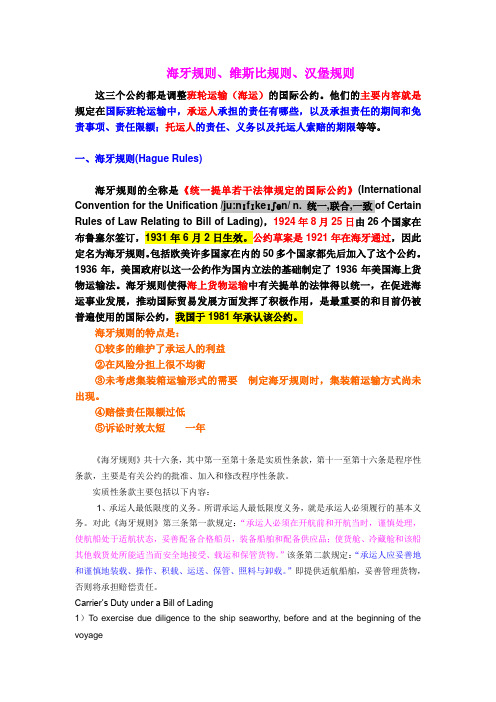
海牙规则、维斯比规则、汉堡规则这三个公约都是调整班轮运输(海运)的国际公约。
他们的主要内容就是规定在国际班轮运输中,承运人承担的责任有哪些,以及承担责任的期间和免责事项、责任限额;托运人的责任、义务以及托运人索赔的期限等等。
一、海牙规则(Hague Rules)海牙规则的全称是《统一提单若干法律规定的国际公约》(International Convention for the Unification /ju:nɪfɪkeɪʃɵn/ n. 统一,联合,一致of Certain Rules of Law Relating to Bill of Lading),1924年8月25日由26个国家在布鲁塞尔签订,1931年6月2日生效。
公约草案是1921年在海牙通过,因此定名为海牙规则。
包括欧美许多国家在内的50多个国家都先后加入了这个公约。
1936年,美国政府以这一公约作为国内立法的基础制定了1936年美国海上货物运输法。
海牙规则使得海上货物运输中有关提单的法律得以统一,在促进海运事业发展,推动国际贸易发展方面发挥了积极作用,是最重要的和目前仍被普遍使用的国际公约,我国于1981年承认该公约。
海牙规则的特点是:①较多的维护了承运人的利益②在风险分担上很不均衡③未考虑集装箱运输形式的需要制定海牙规则时,集装箱运输方式尚未出现。
④赔偿责任限额过低⑤诉讼时效太短一年《海牙规则》共十六条,其中第一至第十条是实质性条款,第十一至第十六条是程序性条款,主要是有关公约的批准、加入和修改程序性条款。
实质性条款主要包括以下内容:1、承运人最低限度的义务。
所谓承运人最低限度义务,就是承运人必须履行的基本义务。
对此《海牙规则》第三条第一款规定:“承运人必须在开航前和开航当时,谨慎处理,使航船处于适航状态,妥善配备合格船员,装备船舶和配备供应品;使货舱、冷藏舱和该船其他载货处所能适当而安全地接受、载运和保管货物。
”该条第二款规定:“承运人应妥善地和谨慎地装载、操作、积载、运送、保管、照料与卸载。
有关海运提单的国际公约

有关海运提单的国际公约
1.《海牙规则》(Hague Rules)
《海牙规则》是1924年在布鲁塞尔由欧美26个航运国家签订,全名为《统一提单的若干法律规则的国际公约》,于1931年6月正式生效。
目前,有80多个国家接受了这个规则。
这一规则对承运人的权利及负责范围的规定一直受到货主方面的批评和航运业不发达国家的反对,因为它有利于船主或承运人,如对由托运人自行装货等17种原因造成的货物损失或延迟交货,可以免除责任。
2.《海牙-维斯比规则》(Hague-Visby Rules)
该规则是对《海牙规则》的修改和补充,于1968年签署《布鲁塞尔议定书》,并于1977年6月23日生效的。
它已扩大了《海牙规则》的适用范围,《海牙规则》只适用于缔约国所签发的提单,《海牙一维斯比规则》既适用于上述提单,也适用于“从一个缔约国港口起运”的提单,还增加了集装箱运输条款等。
3.《汉堡规则》(Hamburg Rules)
由于《海牙一维斯比规则》仅对《海牙规则》作了非本质的修改和补充,航运业不发达国家继续要求对《海牙规则》作全面的修改。
联合国国际贸易法委员会经过数年工作后,于1976年5月拟定了海上货物运输公约草案,1978年3月在汉堡召开的有78个国家的代表参加的联合国海上货物运输会议上,正式通过了这个公约草案,定名为《1978年联合国海上货物运输公约》简称《汉堡规则》。
与《海牙规则》相比,这一规则增加了承运人的责任。
- 1、下载文档前请自行甄别文档内容的完整性,平台不提供额外的编辑、内容补充、找答案等附加服务。
- 2、"仅部分预览"的文档,不可在线预览部分如存在完整性等问题,可反馈申请退款(可完整预览的文档不适用该条件!)。
- 3、如文档侵犯您的权益,请联系客服反馈,我们会尽快为您处理(人工客服工作时间:9:00-18:30)。
5. Improve the carrier’s compensation for the goods damage
• (c) Where a container, pallet or similar article of transport is used to consolidate goods, the number of packages or units enumerated in the Bill of Lading as packed in such article of transport shall be deemed the number of packages or units for the purpose of this paragraph as far as these packages or units are concerned. Except as aforesaid such article of transport shall be considered the package or unit.
1.Expanding the scope of the application of the rules
(a) the Bill of Lading is issued in a Contracting State, or (b) the carriage is from a port in a Contracting State, or (c) the contract contained in or evidenced by the Bill of Lading provides that the rules of this Convention or legislation of any State giving effect to them are to govern the contract whatever may be the nationality of the ship, the carrier, the shipper, the consignee, or any other inlearing the evidence of the effectiveness of the bill of lading
• HAGUE RULES • Such a bill of lading shall be prima facie evidence of the receipt by the carrier of the goods as therein described in accordance with paragraph 3(a), (b) and (c). • Visby Rules • (1) In Article 3, paragraph 4, shall be added: • "However, proof to the contrary shall not be admissible when the Bill of Lading has been transferred to a third party acting in good faith".
6.Extending limitation
3.Emphasized the responsibility of the carrier and the employees
• b. If such an action is broughtliability a. The defences and limits of against a for in this Convention shall provided servant or agent of the carrier (such action against the not apply in any servant or agent carrier being an independent damage to goods in respect of loss or contractor), such servant or agent shall be covered by a contract of carriage entitled to avail himself of the in whether the action be founded defences or inlimits of liability which contract and tort. the carrier is entitled to invoke under this Convention.
• (2) In Article 3, paragraph 6, subparagraph 4 shall be deleted and replaced by: • "Subject to paragraph 6bis the carrier and the ship shall in any event be discharged from all liability whatsoever in respect of the goods, unless suit is brought within one year of their delivery or of the date when they should have been delivered. This period may, however, be extended if the parties so agree after the cause of action has arisen".
Differences
I. Expanding the scope of the application of the rules II. Clearing the evidence of the effectiveness of the bill of lading III. Emphasized the responsibility of the carrier and the employees IV. Improve the carrier’s compensation for the goods damage V. Adding "container terms“ VI. Extending limitation
d. Nevertheless, servant or • c. The aggregateaof the amounts agent of the carrier shall not be recoverable from the carrier, and entitled to avail himself of shall in such servants and agents, the provisions of this Article, if it is no case exceed the limit provided proved that the damage resulted for in an act or omission of the this Convention. from servant or agent done with intent to cause damage or recklessly and with knowledge that damage would probably result.
